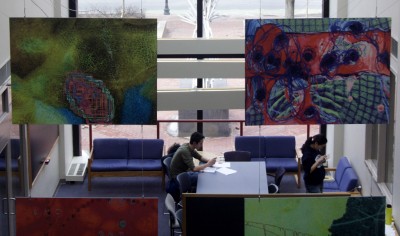
Boston University’s College of Engineering received $145,000 from AT&T to fund a two-year engineering and technology program at a local urban high school as part of the college’s Technology Innovation Scholars Program, according to a Monday press release from ENG.
Starting in September, ENG Inspiration Ambassadors will go to Josiah Quincy Upper School in the Bay Village neighborhood of Boston to mentor ninth graders in order to spark their interest in STEM fields, said Gretchen Fougere, the director of the program and the associate dean of outreach and diversity for ENG.
Fougere said the program is focused on helping urban students who need it the most.
“The program is designed to get kids excited and aware about how math and science are applied to engineering and design and how engineers solve big problems in the world and how they can be part of that process,” she said.
AT&T’s contribution is part of AT&T Aspire, an education initiative focused on high school students and career readiness, the release stated.
“The mentorship provided by Boston University’s Technology Innovation Scholars Program is a perfect example of the enrichment that our local urban students need and deserve,” said Patricia Jacobs, the president of AT&T New England, in the release. “We applaud BU and TISP for their passion for the issue and their proven track record of readying local students for success in college and in their careers.”
Richard Chang, co-headmaster at Josiah Quincy, said he looks forward to working with the ambassadors to help teach students.
“Engaging students in these real-world projects with college students of similar backgrounds will be significant motivators for them to focus on mathematics and science coursework and to attend college,” he said in the release.
Fougere said the Inspiration Ambassadors are taking a “deep dive” into the public school to show that the program works.
“We have a lot of anecdotal evidence that kids are changing their mind about math and science and about their ability, and if you hit them early enough, you can actually change their lives,” she said. “We’ve gotten kids that we’ve touched through our programs that are here with full scholarships.”
The money will specifically be used toward funding the research projects done at Josiah Quincy, Fougere said.
“We’re going take all of these engineering design challenges that are really fun and interacting and realistic and they’re related to cool stuff that we do at BU or cool stuff that AT&T does … and bring that into the classroom with our inspiration ambassadors and prove that it changes kids’ minds about STEM fields and what they want to do when they graduate from high school,” she said.
Fougere said she plans to track the impact of the program over the course of the two years to show its effectiveness.
“What I’m hoping is that those kids at Josiah Quincy have a better appreciation, a better understanding, a better motivation for what they can do after high school graduation, and we can prove that with data to show their overall growth,” she said. “We want to create a model that we can use to share with other universities and colleges that are in urban environments so they too can replicate something like this.”
The upcoming venture at John Quincy plays into ENG’s mission of producing the next generation of engineers, Fougere said.
“It’s also a much more realistic way to inspire younger students before they get into college, because it really shows how technology, which is developed by engineers, makes a difference in society,” she said. “We are [grateful] that they [AT&T] have taken a leadership role and we can really prove that we have something that can be shared broadly to help all of us.”
















































































































